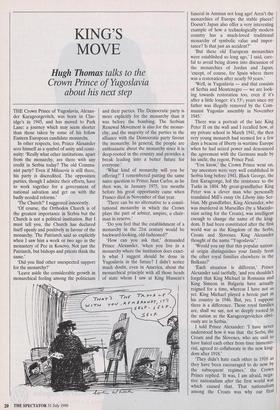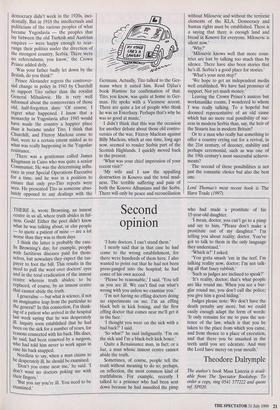KING'S MOVE
Hugh Thomas talks to the Crown Prince of Yugoslavia about his next step
THE Crown Prince of Yugoslavia, Alexan- der Karageorgevitch, was born in Clar- idge's in 1945, and has moved to Park Lane: a journey which may seem shorter than those taken by some of his fellow Eastern European candidate monarchs.
In other respects, too, Prince Alexander sees himself as a symbol of unity and conti- nuity: 'Really what other institutions, apart from the monarchy, are there with any credit in Serbia today? The old Commu- nist party? Even if Milosevic is still there, his party is discredited. The opposition parties, though I admire their efforts, have to work together for a government of national salvation and get on with the badly needed reforms.'
`The Church?' I suggested innocently.
`Of course, the Orthodox Church is of the greatest importance in Serbia but the Church is not a political institution. But I must tell you, the Church has declared itself openly and positively in favour of the monarchy. The Patriarch said so explicitly when I saw him a week or two ago in the monastery of Pec in Kosovo. Not just the Patriarch, but bishops and priests think the same.'
`Did you find other unexpected support for the monarchy?'
`Leave aside the considerable growth in monarchical feeling among the politicians and their parties. The Democratic party is more explicitly for the monarchy than it was before the bombing. The Serbian Renewal Movement is also for the monar- chy, and the majority of the parties in the alliance with the Democratic party favour the monarchy. In general, the people are enthusiastic about the monarchy since it is deep-rooted in the country and provides a break leading into a better future for everyone.'
`What kind of monarchy will you be offering?' I remembered putting the same naive question to Prince Juan Carlos, as he then was, in January 1975, ten months before his great opportunity came when Franco died in November of that year.
`There can be no alternative to a consti- tutional monarchy in which the Crown plays the part of arbiter, umpire, a chair- man in reserve.'
`Do you feel that the establishment of a monarchy in the 21st century would be backward-looking, old-fashioned?'
`How can you ask that,' demanded Prince Alexander, `when you live in a monarchy where the institution does exact- ly what I suggest should be done in Yugoslavia in the future? I didn't notice much doubt, even in America, about the monarchical principle with all those heads of state whom I saw at King Hussein's funeral in Amman not long ago! Aren't the monarchies of Europe the stable places? Doesn't Japan also offer a very interesting example of how a technologically modern country has a much-loved traditional monarchy of symbolic value and impor- tance? Is that just an accident?'
`But these old European monarchies were established so long ago,' I said, care- ful to avoid being drawn into discussion of the monarchies of Jordan and Japan, `except, of course, for Spain where there was a restoration after nearly 50 years.'
`Well, in Yugoslavia — and that consists of Serbia and Montenegro — we are look- ing towards restoration too, even if it's after a little longer: it's 531/2 years since my father was illegally removed by the Com- munist Yugoslav assembly in November 1945.'
There was a portrait of the late King Peter II on the wall and I recalled how, at my private school in March 1941, the then very young monarch had seemed for a few days a beacon of liberty in wartime Europe when he had seized power and denounced the agreement with the Germans made by his uncle, the regent, Prince Paul.
`You know,' the Crown Prince went on, `my ancestors were very well established in Serbia long before 1941. Black George, the first Karageorge, led the resistance to the Turks in 1804. My great-grandfather King Peter was a clever man who personally translated Mill's essay On Liberty into Ser- bian. My grandfather, King Alexander, who was murdered in Marseilles (by a Macedo- nian acting for the Croats), was intelligent enough to change the name of the king- dom. It had been constituted after the first world war as the Kingdom of the Serbs, Croats and Slovenes. King Alexander thought of the name "Yugoslavia".'
`Would you say that this popular nation- al origin distinguishes your family from the other royal families- elsewhere in the Balkans?'
`Each situation is different,' Prince Alexander said tactfully, `and you shouldn't forget that King Michael in Romania and King Simeon in Bulgaria have actually reigned for a time, whereas I have not as yet. King Michael played a heroic part in his country in 1946. But, yes, I suppose there is a difference. Those royal families are, shall we say, not so deeply rooted in the nation as the Karageorgevitches obvi- ously are in Serbia.' I told Prince Alexander: `I have never understood how it was that the Serbs, the Croats and the Slovenes, who are said to have hated each other from time immemo- rial, agreed to collaborate in the new king- dom after 1918.'
`They didn't hate each other in 1918 as they have been encouraged to do now by the subsequent regimes,' the Crown Prince replied. `It was, I am afraid, nega- tive nationalism after the first world war which caused that. That nationalism among the Croats was why our first democracy didn't work in the 1920s, inci- dentally. But in 1918 the intellectuals and politicians of the various peoples of what became Yugoslavia — the peoples that lay between the old Turkish and Austrian empires — were happy enough to rear- range their politics under the direction of the strongest country, Serbia. There were no referendums, you know,' the Crown Prince added drily.
Was your father badly let down by the British, do you think?'
Prince Alexander regrets the controver- sial change in policy in 1943 by Churchill to support Tito rather than the royalist General Mihailovic. He is very well informed about the controversies of those old, half-forgotten days: 'Of course, I regret what happened. I know that a monarchy in Yugoslavia after 1945 would have made the country a happier place than it became under Tito. I think that Churchill, and Fitzroy Maclean come to that, were to a certain extent misled as to what was really happening in the Yugoslav resistance.
`There was a gentleman called James Klugmann in Cairo who was quite a senior Communist. He was the determining influ- ence in your Special Operations Executive for a time, and he was in a position to ensure that only pro-Tito reports were seen. He presented Tito as someone abso- lutely opposed to any dealings with the Germans. Actually, Tito talked to the Ger- mans when it suited him. Read Djilas's book Wartime for confirmation of that. Tito, you know, was quite at home in Ger- man. He spoke with a Viennese accent. There are quite a lot of people who think he was an Esterhazy. Perhaps that's why he was so good at music.'
I didn't think that this was the occasion for another debate about those old contro- versies of the war, Fitzroy Maclean against Billy Maclean, which at one time, long ago now, seemed to render Serbia part of the Scottish Highlands. I quickly moved back to the present.
`What was your chief impression of your recent visit?'
`My wife and I saw the appalling destruction in Kosovo and the total mad- ness. The terrible suffering and pain of both the Kosovo Albanians and the Serbs. There will only be peace and reconciliation without Milosevic and without the terrorist elements of the KLA. Democracy and human rights must be established. There is a saying that there is enough land and bread in Kosovo for everyone. Milosevic is silent now.'
`Why?'
`Milosevic knows well that more coun- tries are lost by talking too much than by silence. There have also been stories that he's ill. Serbia's a good place for stories.'
`What's your next step?'
`We hope to get an independent media well established. We have had promises of support. Not yet much money.'
Leaving the Crown Prince's austere but workmanlike rooms, I. wondered to whom I was really talking. To a hopeful but doomed representative of an old cause which has no more real possibility of suc- cess in modern Serbia than, say, the heir of the Stuarts has in modem Britain?
Or to a man who really has something to offer a country crying out for a revival, in the 21st century, of decency, stability and perhaps ceremonial, such as was one of the 19th century's most successful achieve- ments?
The second of these possibilities is not just the romantic choice but also the best one.
Lord Thomas's most recent book is The Slave Trade (1997).



























































 Previous page
Previous page